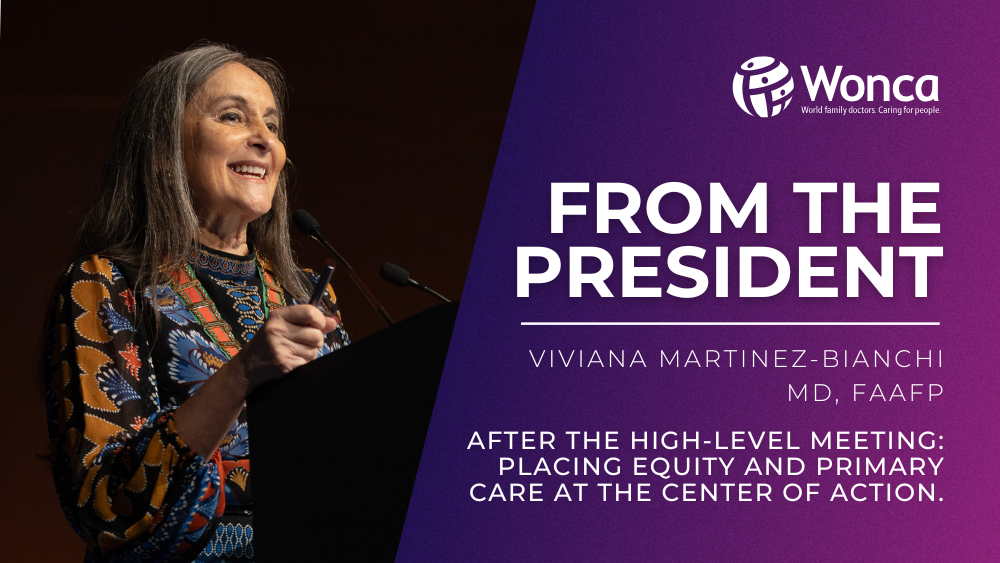From the President: Placing Equity and Primary Care at the Center of Action

After the High-Level Meeting: Placing Equity and Primary Care at the Center of Action.
versión en español
The United Nations High-Level Meeting on noncommunicable diseases (NCDs) and mental health took place at the end of September at the United Nations Headquarters in New York City. In its adopted political declaration, Member States reaffirmed “the need for a comprehensive and people-centred approach, with a view to leaving no one behind, reaching the furthest behind first,” and recognized “the fundamental role of primary health care in achieving universal health coverage.” (see full declaration here).
With this declaration, member states reaffirmed global commitments, urged stronger political will, and called for greater resources, especially for low- and middle-income countries. Delegates emphasized investing in health system strengthening, integrated care, multisectoral action, and support for vulnerable populations, along with increased domestic and international funding for implementation research to advance SDG.
Yet, the literature underscores a persistent gap between political declarations and concrete action. Previous UN meetings have raised awareness but yielded limited measurable outcomes, in part due to insufficient financing. The 2025 meeting sought to close these gaps by urging evidence-based policies such as reducing costs of essential medicines and taxing unhealthy products, and by promoting multisectoral coalitions to drive smarter health spending.
The meeting also stressed the importance of rigorously evaluating national programs, prioritizing interventions that reach the populations most affected by NCDs and mental health conditions, and tailoring strategies to local contexts for maximum impact.
Across the world, family doctors walk alongside people who are living with chronic disease, stress, grief, displacement, and economic pressures. We understand that diabetes, hypertension, depression and anxiety are not simply biochemical processes — they are shaped by working conditions, housing, caregiving responsibilities, discrimination, trauma, and social exclusion.
Healing in these contexts requires continuity, trust, and presence.
I am thinking of a patient I have cared for now for 18 years. I will call her María.
When we first met, she had brought her children to my practice, and as I was seeing them for their well-child checks, I learned she was living with poorly controlled diabetes and long-standing depression. She worked multiple jobs to keep her family afloat. Her days were full, her sleep was short, and her emotional burden was heavy. I became her doctor too. At first, her glucose levels did not improve- her life left little space to breathe, let alone monitor blood sugars.
Over time, our work together deepened. We talked about food and exercise, yes - but also about grief, identity, belonging, migration, and dignity. We adjusted treatment, but we also engaged our social worker, a care manager, community resources, counseling, and support for the whole family. I saw her through years of change, loss, and resilience. Over the years, I continued to care for her children as they grew, and I cared for her as she navigated her own health and life transitions.
This is what it means to practice family medicine.
We do not treat diseases in isolation.
We accompany people, families, and communities across life’s seasons.
From beginning to end of life, I walk with families — with continuity, trust, and shared meaning.
This is the foundation upon which equitable care is built.
The political declaration goes further than intention. It calls on Member States to strengthen primary health care (see pages 9-12 of the declaration) as the platform for prevention, screening, diagnosis, treatment, follow-up, rehabilitation, mental health care, and palliative care. It emphasizes expanding care in community clinics, family practices, and primary care teams. It urges shifting mental health support into primary care, ensuring continuity during emergencies, and reinforcing medication supply chains and team-based care.
In other words: the declaration describes the work that family doctors already do every day and the care that becomes possible when primary care is properly supported.
Yet declaring this is not enough.
The Missing Commitment: Investment in Family Medicine
To achieve what the declaration demands, countries must invest intentionally and substantially in:
- Recruiting and training more family doctors
- Retaining primary care clinicians in the communities they serve by implementing fair and stable compensation and safe working conditions
- Training and support for interprofessional primary care teams
- Community-based mental health integration
- Continuity-of-care infrastructure
- Reliable medication and diagnostic supply chains in primary care settings
- Academic integration of family medicine in medical schools
Without investment in family medicine, primary health care remains an aspiration, not a functioning system.
Without investment in continuity, equity remains a slogan, not a lived experience.
Without investment in the primary care workforce, the commitments made in the declaration cannot be implemented.
A Shared Call to Action
As WONCA President, I call on all of us, -member organizations, educators, clinicians, researchers, and global partners- to align our collective advocacy and leadership in the months ahead:
- Advocate for national budgets that prioritize primary health care and strengthen family medicine education and training pathways
- Support well-being and retention of the health workforce
- Advocate for integration of NCD and mental health services into primary care: emphasizing the cost-effectiveness and reach of primary care in managing NCDs and mental health conditions, especially in low- and middle-income countries
- Partner with communities to co-design care that is culturally grounded and trusted
- Monitor equity progress through data that is disaggregated and transparent and embedding equity indicators in program evaluation
- Advocate for new funding commitments for noncommunicable diseases (NCDs) and mental health
- Promote evidence-based fiscal policies such as excise taxes on tobacco, alcohol, and unhealthy foods, which generate sustainable domestic revenue for NCD and mental health programs, and advocate for lowering the costs of essential medicines
Let us insist that equity is not an afterthought but a design principle.
Let us remind policymakers that continuity of care is a strategy, not a luxury.
Let us continue to advance the global recognition, training, and support of family doctors.
Let us hold firm to the humanity at the center of our profession.
When I think back to María, I am reminded that change comes with trust developed through presence, understanding, and a continuous longitudinal relationship.
Ultimately, while the 2025 UN meeting helped set a renewed vision and momentum, its success will hinge on sustained political commitment, adequate financing, and effective implementation at the country level.
These global declarations give state actors the framework, but clinicians, health workers, communities, and families give the work its meaning.
We do not merely manage illness.
We accompany people.
We bear witness.
We stay.
This is our contribution to health equity, and it is powerful.
Together, we can shape a world in which every person, in every community, has the opportunity to live a healthier, fuller, and more dignified life.
And we will.
 Viviana Martinez-Bianchi, MD, FAAFP
Viviana Martinez-Bianchi, MD, FAAFP
President, World Organization of Family Doctors (WONCA)
References
United Nations Global Political Declaration on NCD and Mental Health
Collins TE, Karapici A, Berlina D. Investing in Addressing NCDs and Mental Health Conditions: a Political Choice. Ann Glob Health. 2025 Apr 29;91(1):22. doi: 10.5334/aogh.4649. PMID: 40321458; PMCID: PMC12047628.
Rodi P, Obermeyer W, Pablos-Mendez A, Gori A, Raviglione MC. Political rationale, aims, and outcomes of health-related high-level meetings and special sessions at the UN General Assembly: A policy research observational study. PLoS Med. 2022 Jan 13;19(1):e1003873. doi: 10.1371/journal.pmed.1003873. PMID: 35025880; PMCID: PMC8757909.
Watkins DA, Danforth K, Ahmed S, Chisholm D, Cieza A, Iunes R, Kumar A, Kutzin J, Luong J, Meessen B, Meheus F, Metitiri O, Muthee T, Qamruddin J, Savedoff W, Schack M, Shibui Y. Financing policies to sustain improved prevention, control, and management of non-communicable diseases and mental health conditions. Lancet Glob Health. 2025 Nov;13(11):e1973-e1982. doi: 10.1016/S2214-109X(25)00347-X. Epub 2025 Sep 19. PMID: 40983067.
NCD Countdown 2030 Collaborators. Benchmarking progress in non-communicable diseases: a global analysis of cause-specific mortality from 2001 to 2019. Lancet. 2025 Sep 20;406(10509):1255-1282. doi: 10.1016/S0140-6736(25)01388-1. Epub 2025 Sep 10. PMID: 40945529; PMCID: PMC7618237.
Wright A, Smith KE, Hellowell M. Policy lessons from health taxes: a systematic review of empirical studies. BMC Public Health. 2017 Jun 19;17(1):583. doi: 10.1186/s12889-017-4497-z. PMID: 28629470; PMCID: PMC5477308.
Miracolo A, Sophiea M, Mills M, Kanavos P. Sin taxes and their effect on consumption, revenue generation and health improvement: a systematic literature review in Latin America. Health Policy Plan. 2021 Jun 3;36(5):790-810. doi: 10.1093/heapol/czaa168. PMID: 33885782; PMCID: PMC8173601.
Hosseinpoor AR, Bergen N, Kirkby K, Schlotheuber A. Strengthening and expanding health inequality monitoring for the advancement of health equity: a review of WHO resources and contributions. Int J Equity Health. 2023 Mar 17;22(1):49. doi: 10.1186/s12939-022-01811-4. PMID: 36932363; PMCID: PMC10022555.